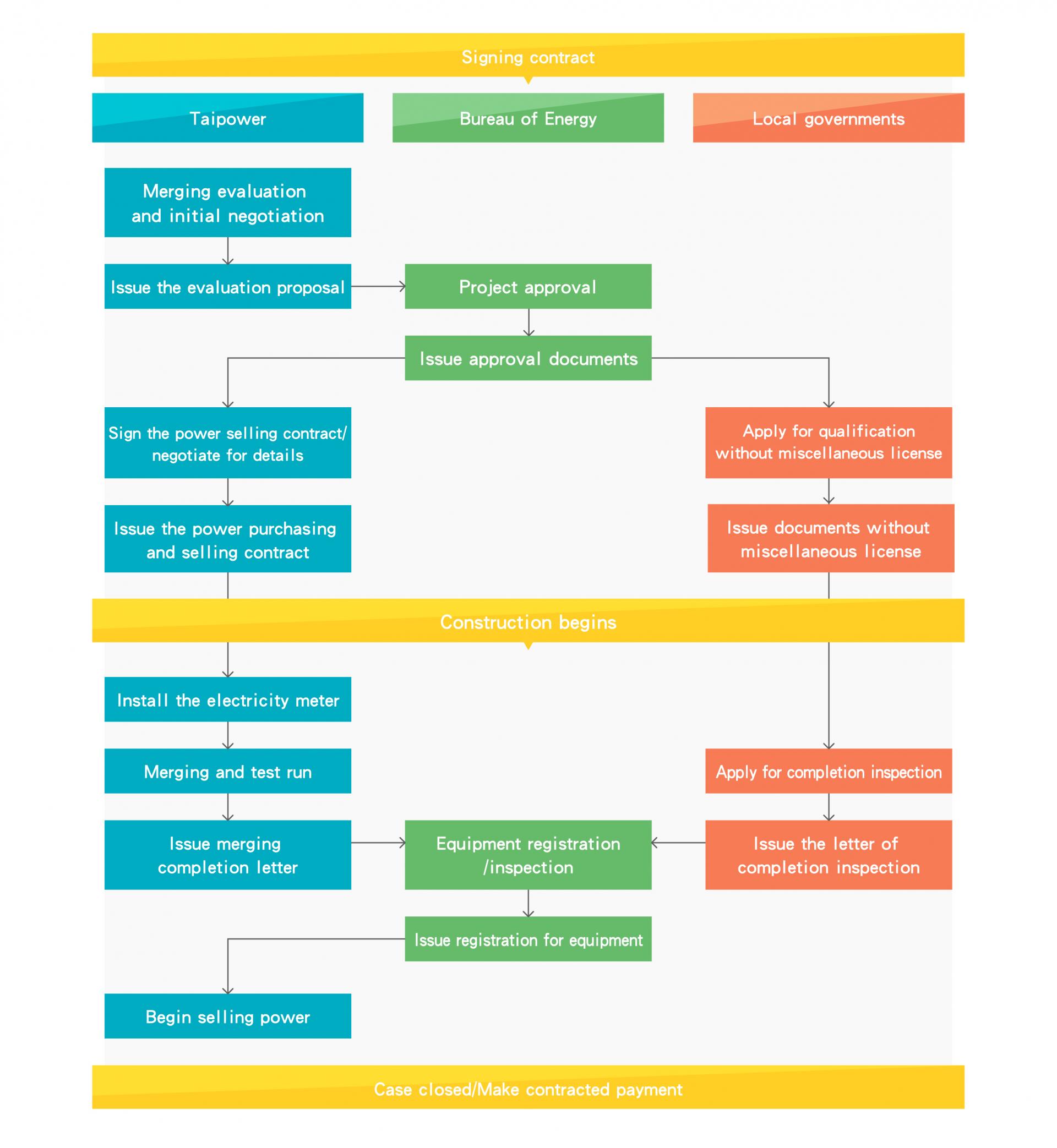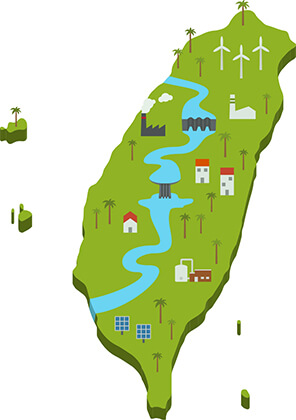
Assisting customers to apply for merging and signing contract of electricity wholesale with Taipower

The application process with the Bureau of Energy and local governments tends to be more complex during the application for large ground-type solar power station. The application must include a management proposal and category of changes.

Assisting customers in applying for subsidy from local governments and financing projects from banks for solar panels.
If customers intend to sell electricity generated by solar power system to Taipower, applications for approval and evaluation must be sent to Taipower, the Bureau of Energy, and the Construction Management Office. In addition, a wholesale contract must be signed with Taipower, along with equipment evaluation after completion. The time frame of installation will take 1-3 months depending on the scale of construction. An additional 3-6 months will be required after contracting to having the system fully operational. After three more months of administrative process, the electricity will be ready for sale.

Taiwan’s energy policy encourages the usage of renewable energy. Since the Development Regulation for Renewable Energy became effective in 2009, the government purchases with a fixed rate (solar energy was priced at NTD 4.32~5.87/kilowatt in 2018) and categorizes various facilities (rooftop type, ground-type, and surface of water type), providing a twenty-year contract purchasing renewable energy. In addition, usage of high-efficiency solar modules would be rewarded with extra 6% of the profit. To encourage offshore islands and the northern area (including Taipei, New Taipei City, Keelung, Taoyuan, Hsinchu, Miaoli, Ilan, and Hualien) to install solar power systems, the purchasing rate will be raised by 15%. The highest rate can be NTD 7.16 per kilowatt. The detailed Taipower purchasing rate for solar panel systems in 2018 is shown on the graph.
.jpg)
The government currently supports FIT to promote the installation of renewable energy. By encouraging generating electricity via renewable energy and selling electricity, the government attempts to promote such energy sources. In addition, various local governments provide subsidies for establishing solar power facilities, which can be more than NTD 10,000 per kW. The subsidies for solar power facilities change each year. Please clickto read more about the latest project of subsidies.The latest government subsidies in 2018

A:Solar power systems do not generate noise during operation. A solar panel of 20,000 kilowatts would only produce the same number of electromagnetic waves as an ordinary appliance (such as computer), which is vastly lower than the environmental limits of the EPA, and does not endanger the human body in any way.
Solar power systems produce no pollution during operation. However, during manufacturing, industrial waste water and gas could be produced, which the factory by law must control to safe standards (waste water and gas disposal). The production of solar panels is like that of semiconductors, albeit without the production of the frontal tip of reticle mask. The production of such frontal tip tends to result in waste gas and toxic water which could result in cancer. Therefore, the pollution it produces is less than semiconductor manufacturers. In addition, compared to traditional coal-fired power generation (thermal power), solar power systems create less than 90% of the air pollution caused by coal-fired generation, even adding in pollution during production.
Solar panels are supported by steel or aluminum framework. The structural design has been approved by technicians. The durability of the structure can handle natural forces like typhoons.➤➤➤To know the construction method
In addition to design and construction, applications must be submitted to Taipower, the Bureau of Energy, and Construction Management Offices of local governments. The installation could take 1-3 months depending on the projects scale, while from signing the contract to the full operation of system takes three to six months. After three months of documentation, selling can begin. ➤➤➤To know the detailed procedure
1. It can be processed through Regulations for Condominium Management
*Article 31: Host a meeting of unit owners and receive the agreement over conference. (Two thirds of the units’ owners must be present, while more than three quarters of participants must agree to it.)
*Article 32: Re-summon the assembly if the agreement is not reached according to Article 31. Three owners of the property and one fifth of residents must be present, while over half of participants have to agree upon the settlement.
*Article 33: Installation on rooftop should be approved by the owner of the level.
*According to Article 34, the notification will be sent to the owners of units 14 days after the meeting. Exclusive usage must be clarified. Note: rooftop should not be considered exclusive.
2. Areas without management committee may follow the regulation of Civil Law.
➤➤➤Read more about examples of installation in condominiums.